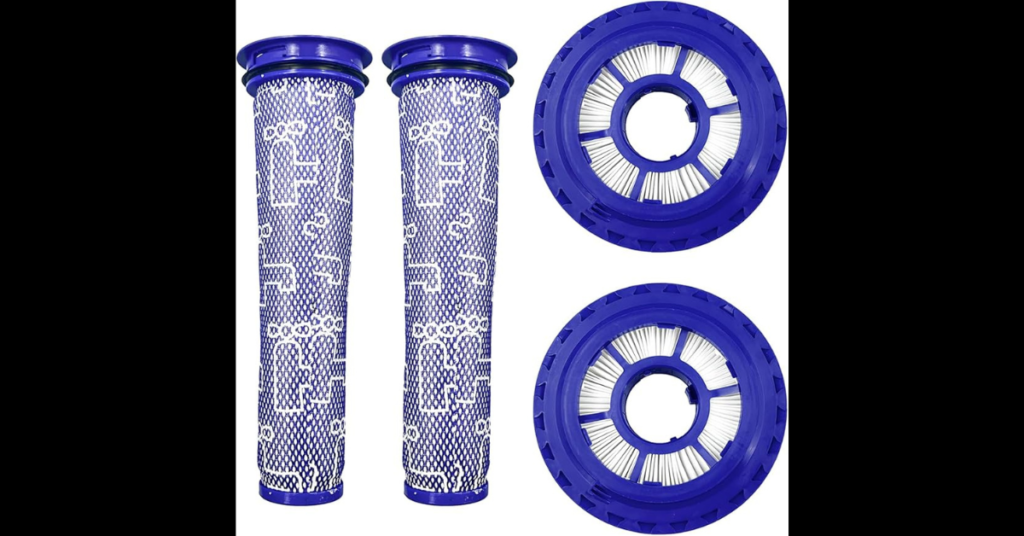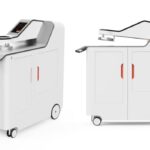The Dyson DC65 Animal vacuum cleaner has gained significant popularity, especially among pet owners, due to its powerful suction and advanced technology. One of the most frequently asked questions about this model is whether its filters are HEPA (High-Efficiency Particulate Air) certified. HEPA filters are known for their ability to trap tiny particles, including allergens and pollutants, making them an essential feature for individuals with allergies or respiratory issues. This article provides an in-depth analysis of the Dyson DC65 Animal’s filtration system, examining whether it meets HEPA standards and exploring the implications for users Are Dyson DC65 Animal Filters HEPA
Understanding HEPA Filters: What They Are and Why They Matter
To fully understand the significance of HEPA filters, it is essential to know what they are and how they work. A HEPA filter is designed to remove at least 99.97% of airborne particles that are 0.3 microns in diameter. This size is often referred to as the “most penetrating particle size” (MPPS) because particles of this size are the hardest to capture. HEPA filters are made from a mat of randomly arranged fibers, typically composed of fiberglass. The filter’s effectiveness stems from several mechanisms: interception, impaction, and diffusion, which work together to trap particles as air flows through the filter.
The importance of HEPA filters cannot be overstated, especially in environments where air quality is a concern. For individuals with allergies, asthma, or other respiratory conditions, a HEPA filter can significantly reduce the number of airborne allergens, such as pollen, pet dander, and dust mites. In households with pets, the use of a HEPA filter becomes even more critical, as pets can shed fur, dander, and other allergens that can exacerbate symptoms.
Dyson’s Filtration System: An Overview
Dyson is renowned for its innovative approach to vacuum cleaner design, and the filtration system is a key component of this innovation. vacuum features a multi-stage filtration system designed to capture a wide range of particles, from large debris to microscopic allergens. The two main filters in the Dyson DC65 Animal are the pre-motor filter and the post-motor filter.
- Pre-Motor Filter: This filter is designed to capture larger particles before they reach the motor. By trapping these particles, the pre-motor filter helps protect the motor from damage and ensures consistent suction power. The pre-motor filter in the Dyson DC65 Animal is washable, which means it can be cleaned and reused, reducing the need for frequent replacements.
- Post-Motor Filter: The post-motor filter is responsible for capturing finer particles before the air is expelled back into the room. This filter plays a crucial role in ensuring that the air released by the vacuum is clean and free from allergens. However, the post-motor filter in the Dyson DC65 Animal is not explicitly labeled as a HEPA filter, leading to questions about its effectiveness in trapping the smallest particles.
Are Dyson DC65 Animal Filters HEPA Certified?
The key question for many potential buyers is whether the filters in the Dyson DC65 Animal meet HEPA standards. The post-motor filter in the Dyson DC65 Animal is designed to capture particles as small as 0.3 microns, which is the same level of filtration required for HEPA certification. However, Dyson does not explicitly market the DC65 Animal’s filters as HEPA certified.
There are several reasons why Dyson might choose not to label the filters as HEPA, despite their similar performance:
- Proprietary Technology: Dyson vacuums use Radial Root Cyclone technology, which separates dust and allergens from the air before they reach the filters. This technology is highly efficient at capturing particles, reducing the reliance on traditional filters. Dyson may prefer to highlight this technology rather than focusing solely on HEPA certification.
- Product Differentiation: Dyson offers other models, such as the Dyson V11, that are explicitly marketed as having HEPA filters. By reserving HEPA certification for certain models, Dyson can create a clear distinction between different product lines, catering to various consumer needs and preferences.
- Marketing Strategy: Dyson may choose to focus its marketing efforts on the overall performance and features of the DC65 Animal, rather than emphasizing the HEPA certification of its filters. This approach allows Dyson to position the DC65 Animal as a versatile and powerful vacuum without getting bogged down in technical details that might confuse some consumers.
Filtration Performance in Real-World Use
While the lack of explicit HEPA certification may raise concerns for some users, it’s important to consider the real-world performance of the Dyson DC65 Animal. Numerous tests and user reviews suggest that the vacuum performs exceptionally well in capturing dust, allergens, and pet hair, even in homes with multiple pets.
The combination of Radial Root Cyclone technology and the post-motor filter allows the DC65 Animal to capture a significant percentage of particles before they are released back into the air. In practice, this means that the Dyson DC65 Animal is highly effective at reducing airborne allergens and improving indoor air quality.
For pet owners, this level of filtration is particularly valuable. Pet hair and dander can quickly accumulate on carpets, furniture, and other surfaces, leading to increased allergen levels in the home. The Dyson DC65 Animal is designed to tackle these challenges head-on, with specialized tools and attachments that make it easy to remove pet hair and dander from a variety of surfaces.
Comparing the Dyson DC65 Animal to Other HEPA-Certified Vacuums
To understand how the Dyson DC65 Animal compares to vacuums with HEPA-certified filters, it is helpful to examine other models on the market that are specifically designed for allergy sufferers and pet owners.
- Shark Navigator Lift-Away: This popular model features a HEPA filter and Anti-Allergen Complete Seal Technology, which ensures that all air passing through the vacuum is filtered before being released. The Shark Navigator Lift-Away is known for its strong suction power and versatility, making it a top choice for pet owners.
- Miele Complete C3 Cat & Dog: The Miele Complete C3 Cat & Dog vacuum is equipped with an Active AirClean filter, which combines HEPA filtration with a charcoal layer to neutralize odors. This model is particularly effective for households with pets, as it not only captures allergens but also helps eliminate pet-related odors.
- Hoover WindTunnel 3 High-Performance Pet: The Hoover WindTunnel 3 features a HEPA filter and a multi-cyclonic filtration system that captures dust, dirt, and allergens. This model is designed for deep cleaning on both carpets and hard floors, making it a versatile option for pet owners.
When compared to these models, the Dyson DC65 Animal holds its own in terms of performance, even without explicit HEPA certification. The Radial Root Cyclone technology sets Dyson apart by reducing the load on the filters and maintaining consistent suction power, even as the dustbin fills up. However, for consumers who prioritize HEPA certification, models like the Shark Navigator Lift-Away or Miele Complete C3 Cat & Dog may offer additional peace of mind.
The Role of Radial Root Cyclone Technology
A key feature of the Radial Root Cyclone technology, which plays a crucial role in the vacuum’s filtration system. This technology uses powerful centrifugal forces to separate dust, dirt, and allergens from the air before they reach the filters. As a result, the majority of particles are trapped in the dustbin, reducing the burden on the filters and enhancing the vacuum’s overall performance.
Radial Root Cyclone technology is particularly effective at capturing fine particles, such as pet dander and pollen, which can trigger allergies and respiratory issues. By capturing these particles early in the filtration process, Dyson vacuums can maintain strong suction power and consistent performance, even as the dustbin fills up.
While Radial Root Cyclone technology is not a substitute for HEPA filtration, it complements the vacuum’s existing filters by reducing the number of particles that need to be captured by the filters. This technology allows the Dyson DC65 Animal to achieve a high level of filtration, even without HEPA certification.
Maintenance and Filter Longevity
Regular maintenance is essential for ensuring the long-term performance of any vacuum, and the Dyson DC65 Animal is no exception. The vacuum’s filters play a crucial role in maintaining suction power and air quality, so it is important to clean and replace them as needed.
- Pre-Motor Filter: The pre-motor filter in the Dyson DC65 Animal is washable and should be cleaned every 3-6 months, depending on usage. To clean the filter, simply remove it from the vacuum, rinse it under cold water, and allow it to dry completely before reinserting it. Regular cleaning of the pre-motor filter helps maintain suction power and protects the motor from damage.
- Post-Motor Filter: The post-motor filter is not washable and is designed to last the lifetime of the vacuum. However, if you notice a decrease in suction power or an increase in dust being released from the vacuum, it may be time to replace the post-motor filter. Replacing the filter is a straightforward process, and Dyson offers replacement filters for purchase on its website.
By following these maintenance guidelines, you can ensure that your Dyson DC65 Animal continues to perform at its best, providing powerful suction and effective filtration for years to come.
Consumer Reviews and Feedback
Consumer feedback is a valuable resource for understanding the real-world performance of the Dyson DC65 Animal. Overall, users are highly satisfied with the vacuum’s ability to capture pet hair, reduce allergens, and maintain strong suction power, even in homes with multiple pets.
Many users praise the Dyson DC65 Animal for its ease of use and effectiveness in tackling pet-related messes. The tangle-free turbine tool is frequently highlighted as a standout feature, making it easy to remove pet hair from upholstery and stairs without the hassle of tangled brushes.
However, some users express concerns about the lack of explicit HEPA certification for the filters. For individuals with severe allergies or respiratory conditions, this may be a point of hesitation. Despite this, many users report significant improvements in air quality and a reduction in allergy symptoms after using the Dyson DC65 Animal.
Alternatives to the Dyson DC65 Animal
While the Dyson DC65 Animal is a popular choice, it may not be the perfect fit for everyone. For those seeking alternatives with explicit HEPA certification, there are several models to consider:
- Dyson Ball Animal 2: This newer model from Dyson features a HEPA filter and offers even more powerful suction than the DC65 Animal. It is designed for homes with pets and is particularly effective at removing pet hair and allergens from carpets and upholstery.
- Shark APEX DuoClean: The Shark APEX DuoClean vacuum features a HEPA filter and Anti-Allergen Complete Seal Technology, making it a strong contender for allergy sufferers. This model also includes a self-cleaning brush roll, which prevents hair from wrapping around the brush and ensures consistent performance.
- Miele Blizzard CX1 Cat & Dog: The Miele Blizzard CX1 Cat & Dog vacuum is a bagless model with a HEPA filter and powerful suction. It is designed specifically for pet owners and includes a range of tools for removing pet hair from various surfaces.
These alternatives offer similar or enhanced performance compared to the Dyson DC65 Animal, with the added benefit of HEPA-certified filtration. For consumers who prioritize HEPA certification, these models may provide additional peace of mind and assurance of air quality improvement.
Conclusion: Is the Dyson DC65 Animal Right for You?
The question of whether the Dyson DC65 Animal filters are HEPA certified ultimately comes down to a matter of marketing and product differentiation. While the filters in the Dyson DC65 Animal are not explicitly labeled as HEPA, they perform at a similar level, capturing particles as small as 0.3 microns. The combination of Radial Root Cyclone technology and the post-motor filter allows the DC65 Animal to achieve a high level of filtration, making it an effective tool for reducing allergens and improving indoor air quality.
For most pet owners and individuals without severe allergies, the Dyson DC65 Animal offers a powerful and versatile solution for keeping their homes clean and free from pet hair and dander. The vacuum’s strong suction, specialized tools, and innovative technology make it a top choice for tackling pet-related messes.







